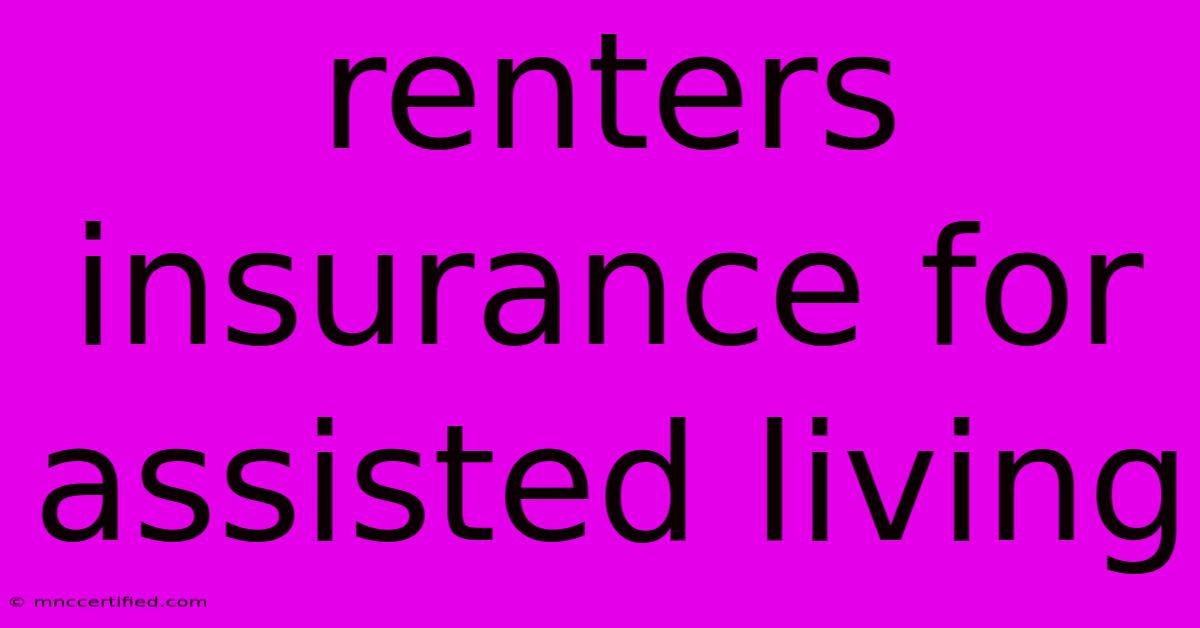Renters Insurance For Assisted Living

Table of Contents
Renters Insurance for Assisted Living: Is it Necessary?
Moving into assisted living can be a significant life change, and it’s important to ensure you're fully protected. While many think of homeowners insurance as the primary coverage for their belongings, renters insurance plays a crucial role in protecting your assets in assisted living facilities.
This article will explore the benefits of renters insurance for assisted living, highlighting its importance and helping you determine if it's right for you.
Why Renters Insurance is Important in Assisted Living
You might assume that the assisted living facility is responsible for covering your belongings in case of damage or theft. However, this is often not the case. Renters insurance provides vital protection for your personal property, including:
- Personal Belongings: This covers furniture, clothing, electronics, jewelry, and other valuable items you bring to your assisted living unit.
- Liability Coverage: Protects you from financial loss due to accidents within your unit, such as a visitor tripping and getting injured.
- Medical Payments Coverage: Covers medical expenses for you or others injured in your unit, even if you are not at fault.
- Personal Property Loss: Provides financial compensation if your belongings are stolen or damaged due to fire, water damage, or other covered perils.
What is Covered Under Renters Insurance?
Here’s a breakdown of typical renters insurance coverage:
Personal Property Coverage: This is the core component of renters insurance. It covers your belongings against various risks, including:
- Fire and Smoke Damage: Covers losses caused by fires and resulting smoke damage.
- Water Damage: Protects against leaks, burst pipes, and flooding, depending on your policy.
- Theft and Vandalism: Offers coverage against theft and vandalism of your belongings.
- Natural Disasters: Many policies cover damage caused by hurricanes, earthquakes, and other natural disasters.
Liability Coverage: This protects you financially if someone is injured on your property, regardless of fault. It covers:
- Medical Expenses: Pays for medical bills for injuries suffered on your property.
- Legal Defense Costs: Covers legal fees if you are sued due to an accident in your unit.
- Settlements and Judgments: Provides financial compensation for settlements or judgments against you.
Additional Coverage Options:
- Personal Property Replacement Cost: This covers the cost of replacing stolen or damaged items at their current market value, rather than depreciated value.
- Identity Theft Coverage: Protects you against financial losses due to identity theft.
- Additional Living Expenses: Covers temporary housing and other expenses if you are displaced from your unit due to a covered event.
How Much Renters Insurance Do I Need?
The amount of coverage you need depends on the value of your belongings. Here's how to determine the right coverage for you:
- Inventory Your Possessions: Create a list of all your belongings and estimate their value.
- Consider Replacement Cost: Factor in the current market value of replacing your items.
- Review Coverage Limits: Compare different renters insurance policies to find coverage limits that suit your needs.
Finding the Right Renters Insurance
When choosing renters insurance, consider the following factors:
- Coverage Limits: Make sure the policy provides sufficient coverage for your belongings.
- Deductible: The deductible is the amount you pay out of pocket before your insurance kicks in. A higher deductible typically results in lower premiums.
- Perils Covered: Ensure your policy covers the risks that are most relevant to you, such as fire, theft, or natural disasters.
- Premium Cost: Compare premiums from different insurance companies to find the most affordable option.
FAQs
Q: Can I get renters insurance if I’m only living in assisted living for a short time?
A: Yes, renters insurance is available for both short-term and long-term residents of assisted living facilities.
Q: How do I file a claim with my renters insurance?
A: Contact your insurance company immediately after an incident. They will guide you through the claim process.
Q: Does renters insurance cover my medical bills in assisted living?
A: Renters insurance may cover medical expenses for injuries sustained in your unit, but it's essential to check your policy details.
Conclusion
Renters insurance offers essential protection for your belongings and personal liability in assisted living. While it may not be mandatory, it provides peace of mind knowing your assets are secure. By understanding your coverage needs and carefully selecting a policy, you can ensure you are adequately protected in your new home.
Remember to:
- Inventory your belongings.
- Compare different policies.
- Choose a policy that meets your needs.
- File claims promptly.
Taking these steps will help you secure the right renters insurance coverage and safeguard your future in assisted living.

Thank you for visiting our website wich cover about Renters Insurance For Assisted Living. We hope the information provided has been useful to you. Feel free to contact us if you have any questions or need further assistance. See you next time and dont miss to bookmark.
Featured Posts
-
Where To Watch Colorado Vs Texas Tech Game
Nov 10, 2024
-
Colorado Vs Texas Tech Injury Report
Nov 10, 2024
-
Personalized Project Reference Ap Csp
Nov 10, 2024
-
U 19 T20 World Cup Nepals Winning Streak Continues
Nov 10, 2024
-
Free Rutgers Vs Minnesota Live Stream 11 9 24
Nov 10, 2024